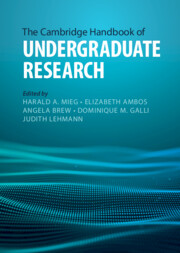Book contents
- The Cambridge Handbook of Undergraduate Research
- The Cambridge Handbook of Undergraduate Research
- Copyright page
- Contents
- Figures
- Tables
- Contributors
- Foreword
- Foreword
- 1 Introduction
- Part I Theory and Research on Undergraduate Research
- Part II Implementation, Approaches, Methods
- Part III Disciplines
- 17 Introduction
- Part III.1 STEM
- Part III.2 Health
- Part III.3 Social Sciences
- Part III.4 Humanities
- Part III.5 Arts & Design
- Part III.6 Disciplines A–Z
- 40 Undergraduate Research in Business Schools
- 41 Undergraduate Research in Early Childhood Education
- 42 Undergraduate Research in Geography
- 43 Undergraduate Research in Legal Studies
- 44 Undergraduate Research in Social Work Education
- 45 Approaches to Undergraduate Research in Sustainability
- 46 Undergraduate Research in Teacher Education
- Part IV International Perspective
- Part V Avenues for Developing Undergraduate Research
- Index
- References
42 - Undergraduate Research in Geography
from Part III.6 - Disciplines A–Z
Published online by Cambridge University Press: 11 August 2022
- The Cambridge Handbook of Undergraduate Research
- The Cambridge Handbook of Undergraduate Research
- Copyright page
- Contents
- Figures
- Tables
- Contributors
- Foreword
- Foreword
- 1 Introduction
- Part I Theory and Research on Undergraduate Research
- Part II Implementation, Approaches, Methods
- Part III Disciplines
- 17 Introduction
- Part III.1 STEM
- Part III.2 Health
- Part III.3 Social Sciences
- Part III.4 Humanities
- Part III.5 Arts & Design
- Part III.6 Disciplines A–Z
- 40 Undergraduate Research in Business Schools
- 41 Undergraduate Research in Early Childhood Education
- 42 Undergraduate Research in Geography
- 43 Undergraduate Research in Legal Studies
- 44 Undergraduate Research in Social Work Education
- 45 Approaches to Undergraduate Research in Sustainability
- 46 Undergraduate Research in Teacher Education
- Part IV International Perspective
- Part V Avenues for Developing Undergraduate Research
- Index
- References
Summary
Undergraduate research needs to be rooted in a specific disciplinary context, such as geography. Depending on the disciplinary tradition, training students as researchers requires a research-based curriculum that involves students in the research process instead of merely confronting them with the outcome of previous research. Walkington (2019) stresses that significant progress is already visible in the field, yet myriad aspects, such as mentoring, the role of research in teacher training, or research skills and employability require further attention. This chapter takea up Willison and O’Regan’s (2007) inclusive definition of student research as “[…] a continuum of knowledge production, from knowledge new to the learner to knowledge new to humankind, moving from the commonly known, to the commonly not known, to the totally unknown.” The chapter explores possible curricular architectures for geography undergraduate programs followed by a brief discussion of geography’s special formats to foster undergraduate research.
Keywords
- Type
- Chapter
- Information
- The Cambridge Handbook of Undergraduate Research , pp. 398 - 405Publisher: Cambridge University PressPrint publication year: 2022



